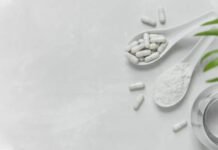
It seems like science keeps flip-flopping as to whether multivitamins are worthwhile or useless, with some science claiming the use of multivitamins may cause more harm than good. Overall, you should aim to get the bulk of your vitamins through whole food sources rather than pills. Too bad most of us fail to do so, as the Standard American Diet (SAD) has involved more processed foods over the years — which isn’t good for your health or your gut. While you’re told to make sure you’re getting enough vitamins and minerals, but if you’re not sure of what some of them do, it’s hard to know why you really need them. This should help clear up why you need vitamins B and D. To know how much you need, check the government’s recommended daily intake here.
B Complex Vitamins
B complex vitamins are chemically distinct compounds that, among other important functions, enable the body to convert food into energy and form red blood cells. These vitamins are water-soluble, which means they can’t be easily stored.
B1
Why it’s important: Also known as thiamine, it helps build new body cells. Important for normal nervous system function.
Best way to get it: Wheat germ, spinach, peanuts, beans, whole grains, kale, blackstrap molasses.
Symptoms you’re not taking enough: Fatigue, irritability, headache, nausea, depression, abdominal discomfort.
Symptoms you’re getting in too much: Getting overdosed with B1 is extremely rare. Symptoms may be: upset stomach, allergic reaction, deficiency of other B-complex vitamins.
B2
Why it’s important: B2 or riboflavin is known as an antioxidant. It fights free radicals and prevents you from early aging. Responsible for protein and carbohydrates digestion. It also protects heart function and mucous membranes. Known also as “energy vitamin”, since it soothes stress and fatigue.
Best way to get it: Milk, yogurt, eggs, almonds, wild rice, spinach, soybeans, Brussel sprouts, brewer’s yeast, whole grains, wheat germ, mushrooms, organ meats, salmon, tomatoes.
Symptoms you’re not taking enough: Fatigue, slower growth, digestive problems, cracks and sores around the corners of the mouth, swollen magenta-colored tongue, eye fatigue, swelling and soreness of the throat; in severe case anemia and sensitivity to light.
Symptoms you’re getting in too much: Bright yellow urine color.
B3
Why it’s important: Also known as niacin, it regulates growth and enables oxygen to flow into body tissues. Lows cholesterol and helps metabolize sugars and fats, providing you with a healthy appetite.
Best way to get it: Peanuts, poultry, liver and other organ meats, fish. Also can be found in whole grains, legumes, dried fruits and avocado.
Symptoms you’re not taking enough: Niacin deficiency is very rare in developed countries. It can cause pellagra, including following symptoms: diarrhea, inflamed skin, mental confusion, weakness, insomnia, sensitivity to light, and aggression. Untreated pellagra can lead to death.
Symptoms you’re getting in too much: Niacin flush (red skin and painful itch), possible liver damage.
B5
Why it’s important: Pantothenic acid or B5 is anti-stress vitamin; it supports hormone production of adrenal glands, enabling you to behave rationally in stressful situations. Furthermore, it helps cells metabolize fats and carbohydrates. Regulates blood sugar levels, supports the immune system and protects blood cells that carry oxygen.
Best way to get it: Found literally everywhere (Greek pantothen -“from every side”). You’ll get the most of it out of egg yolks, fish, whole grains, sweet potatoes, green peas, cauliflower, and avocado.
Symptoms you’re not taking enough: Fatigue, nervousness, problems with metabolism, premature graying of hair, restlessness, abdominal pain.
Symptoms you’re getting in too much: Usually passed through the urine with no problems.
B6
Why it’s important: One of the best vitamins for men, B6 or pyridoxine is essential for heart health protection. Plays an important part in fats and proteins metabolism. Also known as “good-mood” vitamin, it relaxes and energizes the body.
Best way to get it: Liver, chicken, fish, pork, lamb, eggs, whole grains, soybeans, potatoes, nuts, seeds, dark green vegetables.
Symptoms you’re not taking enough: Problems with skin and energy levels, mood disorders.
Symptoms you’re getting in too much: Extremely rare, an overdose could cause nerve inflammation and pain.
B7
Why it’s important: Biotin or “beauty vitamin” is essential for skin renewal, as well as for hair and nail growth.
Best way to get it: Found in small amounts in rice, yogurt, and liver, as well as in egg yolks, barley, yeast, pork meat, chicken, fish and nuts.
Symptoms you’re not taking enough: Skin rashes, slow hair growth or hair loss, brittle nails.
Symptoms you’re getting in too much: Overdose or toxicity not known.
B9
Why it’s important: Known as “pregnancy vitamin”, but you need it too. It is essential for the production of new body cells and tissues, along with normal growth and wound healing.
Best way to get it: Leafy green vegetables, asparagus, beets, salmon, root vegetables, milk, bulgar
Symptoms you’re not taking enough: Diarrhea, depression, confusion, anemia
Symptoms you’re getting in too much: Overdose or toxicity not known.
B12
Why it’s important: B12 or cobalamin is essential for the production of myelin – a substance that covers nerves and enables messages between nerve cells.
Best way to get it: Found in animal-based foods, such as eggs, dairy products, meats, and fish. Vegans should take B12 supplements.
Symptoms you’re not taking enough: Fatigue, depression, poor memory, in severe cases irreversible damages to the brain and nervous system.
Symptoms you’re getting in too much: Overdose or toxicity not known.
Also Read: The Best Vitamins For Men: Vitamin C
Does vitamin C help prevent colds? Yep, and a lot more than that.




